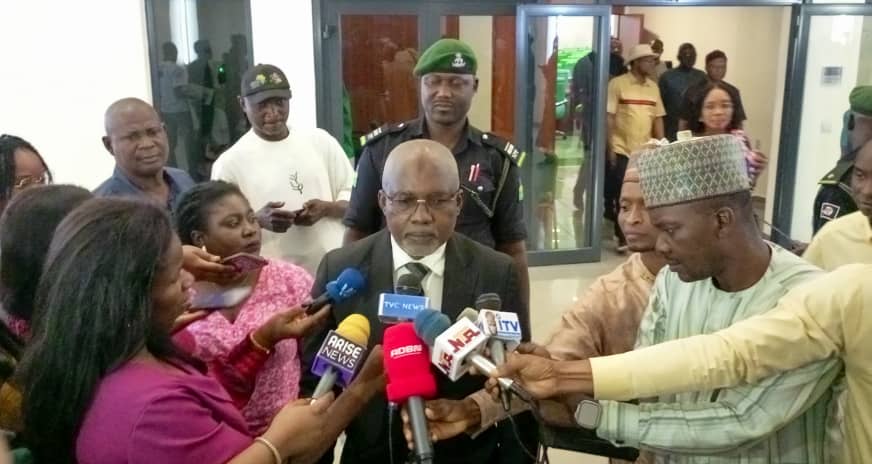With over 3million displace and over 300,000 children at risk of malnutrition, the House of Representatives has emphasised that flooding requires coordinated and urgent action

The Minister of State, Humanitarian Affairs and Poverty Alleviation, Tanko Sununu, has revealed that Nigeria is facing a worsening humanitarian crisis with over 3 million people internally displaced as a result of flooding, insecurity, and other natural disasters.
The minister warned that millions of citizens risk sliding deeper into hunger and malnutrition as global aid funding diminish.
Sununu stated this while speaking during the inauguration of the House of Representatives ad-hoc committee on flood management and response on Monday.
He explained that the combined effects of natural disasters, insecurity, and shrinking donor support have created a “critical humanitarian challenge” for the country.
He said : “Globally, humanitarian funding is shrinking, and Nigeria is not exempt,”
“Just a few days ago, the World Food Programme suspended some of its activities, which had supported more than 1.2 million Nigerians with emergency transfers in the north-east. This leaves over 300,000 children at risk of malnutrition, while more than 200,000 are already receiving treatment.” the minister added
Citing the United Nations estimates, the minister said that over 24.8 million Nigerians have suffered some form of hunger, while more than 3 million people remain internally displaced as a result of flooding, insecurity, and other natural disasters.
The minister disclosed that the figures remains unevenly spread across the country with the north accounting for about 65 per cent of Nigeria’s poor population. Of this 65 percent the minister said 70 percent are smallholder farmers whose farmlands and livelihoods have been destroyed by floods and droughts
“In response to the crisis, the Federal Government is strengthening interventions through the National Social Investment Programme (NSIP),” the minister added
He disclosed that under the Government Enterprise and Empowerment Programme (GEEP), smallholder farmers have received interest-free loans of ₦300,000 each to help them recover from losses.
According to the minister, more than 5.9 million households—approximately 25 million Nigerians—have benefited from ₦419 billion in conditional cash transfers. The funds, he explained, are meant to cushion the impact of economic hardship and sustain vulnerable families.
“These efforts are part of President Bola Tinubu’s commitment to ensuring that Nigerians maintain dignity of life despite economic challenges,” the minister said. “With the support of the House of Representatives, we will continue to work to protect vulnerable households and restore livelihoods.”
The minister commended the National Assembly for setting up a dedicated committee to oversee humanitarian interventions, adding that the move would strengthen transparency and improve the delivery of aid to affected communities.
ALSO READ: 11 Motions in 21 Months: Senate inaction as 2025 flooding looms
In his opening remarks, chairman of the newly constituted committee Rep. Maidala Balami, said flooding had become more than a seasonal occurrence, describing it as a “national emergency” that demands urgent, coordinated, and strategic action.
Balami said “Each year, lives are lost, properties destroyed, livelihoods disrupted, and the socio-economic fabric of entire communities severely affected.
“The time for piecemeal approaches is over. What we need is a comprehensive national framework—one that encompasses prevention, early warning systems, emergency response, community resilience, infrastructure development, and climate adaptation strategies.”
He pledged that the committee would investigate root causes, assess agency preparedness, engage stakeholders, and propose lasting measures to mitigate the impact of flooding across the country.
Inaugurating the committee, the Speaker of the House of Representatives, Rep. Abbas Tajudeen, represented by the Leader of the House, Rep. Julius Ihonbvere, charged members to provide both immediate and long-term solutions to Nigeria’s recurring flood crisis.
He said flooding, has in recent years, inflicted devastating losses on Nigerian communities, destroying livelihoods, displacing families, and undermining development efforts.
He tasked the committee to identify gaps in Nigeria’s preparedness and recommend a clear roadmap for national resilience against flooding.
Abbas urged the committee to work closely with key agencies, including the National Emergency Management Agency (NEMA), the Ministries of Environment, Water Resources, Health, Works, and Housing, as well as state and local governments. He also highlighted the role of the Nigerian Space Agency in providing satellite imagery for effective flood mapping.
“Flood management requires the concerted involvement of all relevant stakeholders. Only a holistic and coordinated approach will ensure a sustainable response,” he emphasized
The speaker directed the committee to identify legislative gaps hindering effective flood management. He reiterated that the House stands ready to strengthen the legal framework to better protect Nigerians
Recent Flood Impacts
Nigeria has been experiencing severe flooding, particularly intensified in recent years, causing major devastation and displacement. In 2025, starting from April, Nigeria faced a series of floods impacting many states, with the deadliest being in May in Mokwa, Niger State, where at least 500 people were killed, thousands displaced, and many more missing or injured.
Mokwa, a key trading hub, experienced flash flooding following heavy rains and a possible dam collapse. The floods damaged critical infrastructure, including roads and bridges, further complicating rescue and relief efforts.
At least 15 million Nigerians are at high risk of flooding in 2025, with more than 30 states affected. Causes include heavy rainfall, poor drainage systems, weak infrastructure, and the release of water from hydroelectric dams such as the Jebba dam.
Climate change, rapid urbanization, deforestation, and insufficient government response have exacerbated the frequency and severity of floods.
Parliament Reports, in its Motions & Movement series, highlighted how both the Senate and the House of Representatives frequently raise motions—particularly on flooding—during plenary sessions.
Within the first ten months of the 10th House, this medium recorded that the House moved 52 motions, while the Senate raised 11 motions on issues relating to natural disasters such as floods, erosion, and windstorms.
Many of these motions have repeatedly resurfaced in both chambers, often urging NEMA and other relevant agencies to provide humanitarian assistance and relief materials to victims of such disasters.

